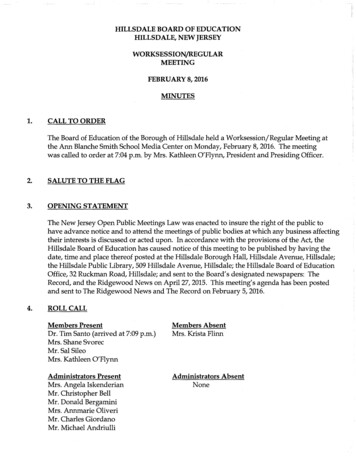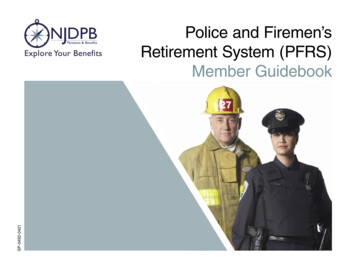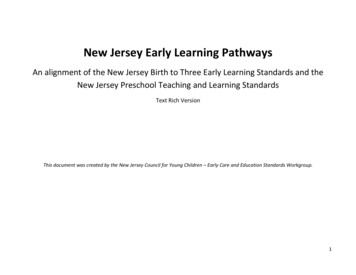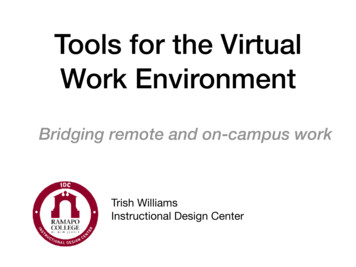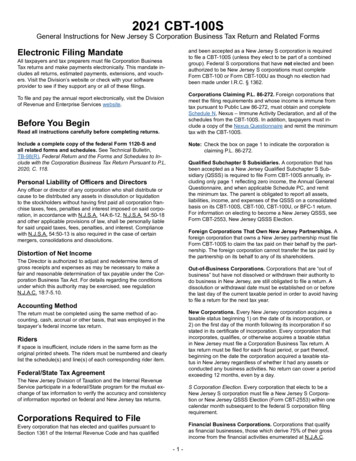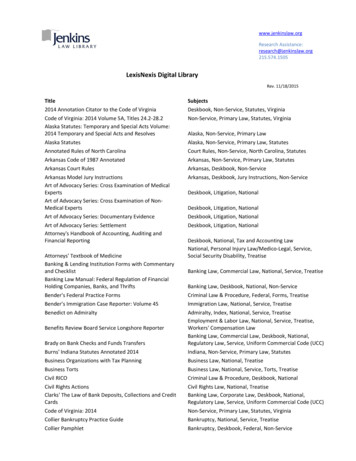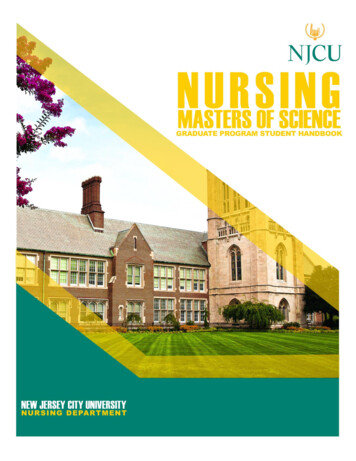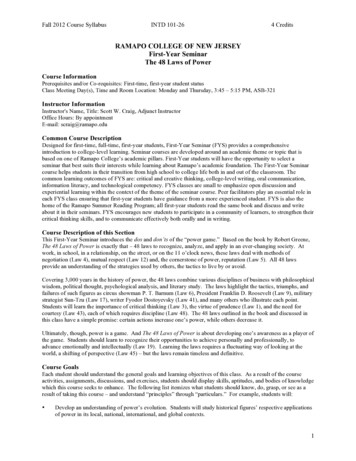
Transcription
Fall 2012 Course SyllabusINTD 101-264 CreditsRAMAPO COLLEGE OF NEW JERSEYFirst-Year SeminarThe 48 Laws of PowerCourse InformationPrerequisites and/or Co-requisites: First-time, first-year student statusClass Meeting Day(s), Time and Room Location: Monday and Thursday, 3:45 – 5:15 PM, ASB-321Instructor InformationInstructor's Name, Title: Scott W. Craig, Adjunct InstructorOffice Hours: By appointmentE-mail: scraig@ramapo.eduCommon Course DescriptionDesigned for first-time, full-time, first-year students, First-Year Seminar (FYS) provides a comprehensiveintroduction to college-level learning. Seminar courses are developed around an academic theme or topic that isbased on one of Ramapo College’s academic pillars. First-Year students will have the opportunity to select aseminar that best suits their interests while learning about Ramapo’s academic foundation. The First-Year Seminarcourse helps students in their transition from high school to college life both in and out of the classroom. Thecommon learning outcomes of FYS are: critical and creative thinking, college-level writing, oral communication,information literacy, and technological competency. FYS classes are small to emphasize open discussion andexperiential learning within the context of the theme of the seminar course. Peer facilitators play an essential role ineach FYS class ensuring that first-year students have guidance from a more experienced student. FYS is also thehome of the Ramapo Summer Reading Program; all first-year students read the same book and discuss and writeabout it in their seminars. FYS encourages new students to participate in a community of learners, to strengthen theircritical thinking skills, and to communicate effectively both orally and in writing.Course Description of this SectionThis First-Year Seminar introduces the dos and don’ts of the “power game.” Based on the book by Robert Greene,The 48 Laws of Power is exactly that – 48 laws to recognize, analyze, and apply in an ever-changing society. Atwork, in school, in a relationship, on the street, or on the 11 o’clock news, these laws deal with methods ofnegotiation (Law 4), mutual respect (Law 12) and, the cornerstone of power, reputation (Law 5). All 48 lawsprovide an understanding of the strategies used by others, the tactics to live by or avoid.Covering 3,000 years in the history of power, the 48 laws combine various disciplines of business with philosophicalwisdom, political thought, psychological analysis, and literary study. The laws highlight the tactics, triumphs, andfailures of such figures as circus showman P. T. Barnum (Law 6), President Franklin D. Roosevelt (Law 9), militarystrategist Sun-Tzu (Law 17), writer Fyodor Dostoyevsky (Law 41), and many others who illustrate each point.Students will learn the importance of critical thinking (Law 3), the virtue of prudence (Law 1), and the need forcourtesy (Law 43), each of which requires discipline (Law 48). The 48 laws outlined in the book and discussed inthis class have a simple premise: certain actions increase one’s power, while others decrease it.Ultimately, though, power is a game. And The 48 Laws of Power is about developing one’s awareness as a player ofthe game. Students should learn to recognize their opportunities to achieve personally and professionally, toadvance emotionally and intellectually (Law 19). Learning the laws requires a fluctuating way of looking at theworld, a shifting of perspective (Law 45) – but the laws remain timeless and definitive.Course GoalsEach student should understand the general goals and learning objectives of this class. As a result of the courseactivities, assignments, discussions, and exercises, students should display skills, aptitudes, and bodies of knowledgewhich this course seeks to enhance. The following list itemizes what students should know, do, grasp, or see as aresult of taking this course – and understand “principles” through “particulars.” For example, students will: Develop an understanding of power’s evolution. Students will study historical figures’ respective applicationsof power in its local, national, international, and global contexts.1
Fall 2012 Course SyllabusINTD 101-264 Credits Develop an understanding of the aims of modern-day leadership, and the skills needed to pursue it. Eachstudent will assess his or her role as a leader and perform a personal “power analysis” as a way of learning howto work with and understand others. Learn the philosophical, political, and psychological approaches to team-building. Students will assemble,motivate, and nurture first-rate and fully-functional groups. Learn to speak and express themselves in front of an audience. Each student will demonstrate his or herpublic-speaking ability through regular oral presentations. Be active communicators, critical thinkers, and problem solvers through their analytical, persuasive, andreflective writing and class participation.Measurable Student Learning OutcomesThis section articulates what students should know or be able to do after taking this course:ResearchPaperClassdiscussionsand rate the ability to think critically andcreativelyxxxxdemonstrate proficiency in writtencommunicationxxxxdemonstrate proficiency in oral communicationxxxxdemonstrate information literacy andtechnological competencyxStudents will:xPeer FacilitatorsAs an added resource for first-year students, each section of First-Year Seminar (FYS) will have a peer facilitator.These upper-level students will attend FYS classes and assist the instructor with the academic topics covered in thisseminar. They will serve as discussion leaders on issues that pertain to your personal and social development andthey will facilitate weekly discussions on the class readings. Your peer facilitator will be your mentor and will beavailable to you to provide guidance on navigating the different personal and social hurdles that you may encounterin your first year at Ramapo.First-Year Academic AdvisingEach First-Year Seminar course is assigned a professional Academic Advisor from the Center for AcademicAdvising and First-Year Experience (CAAFYE) who serves as your Academic Advisor during your first year. Thisadvisor will attend your First-Year Seminar class for a group advisement session to review general academicadvising policies and procedures. They will also be available to answer any general questions regarding collegepolicies/practices. Students are encouraged to schedule individual appointments with their CAAFYE Advisor forassistance with course selection and the development of a personal academic plan. If you have any questionsregarding Academic Advisement please call CAAFYE at (201) 684-7441 or via email at: caafye@ramapo.edu.Texts, Readings, MaterialsThis semester’s texts are available at the Ramapo College bookstore. Note that readings may be revised as thecourse progresses. Additional readings will be assigned, either through the library databases or online. I will providemore information on how to access them by Week 4 of the course.Keep up with reading assignments this semester, which will come from the following books:2
Fall 2012 Course SyllabusINTD 101-264 CreditsGreene, Robert. The 48 Laws of Power. New York: Penguin, 2000. ISBN 978-0-1402-8019-7.Hacker, Diana, and Nancy Sommers. Rules for Writers (7th ed.). Boston: Bedford/St. Martin's, 2012. Print.ISBN-13: 978-0-312-64795-7.Nugent, Benjamin. American Nerd: The Story of My People. New York: Scribner, 2008. Print. ISBN-13: 9780-7432-8802-6.Zelinsky, Paul O. Rumpelstiltskin. New York: Puffin Books, 1986. ISBN: 978-0-14-055864-7.Course RequirementsClassroom discussions and explanations will guide you through the reading and writing assignments. You shouldalso email me or schedule a conference if you have difficulty with any course material.Please refer to the Weekly Class Schedule for dates when tests are scheduled and texts must be read. Dates indicatewhen assignments are due. Complete all reading and writing assignments on time and participate in classdiscussions. Late work and excessive absences will negatively affect your final grade. You are expected to uselibrary resources and document sources in appropriate MLA style. To pass this course, students must demonstratecritical thinking skills, the ability to use information technology and communicate effectively. These skills will beassessed in reviewing a student’s overall performance – his or her written work, participation, preparation, andability to work with others.Complete your assignments before a classroom session begins – “assignments” includes any reading listed for thatday. For example, by the time you arrive to the first day of class, you should have already read the summer reading.Participate in class discussions, and take notes on lectures, presentations, and reading assignments. Among therequirements which apply, the following are important to note:Class ParticipationYou will be expected to take part in class discussions when appropriate. With comments, quality is more importantthan quantity. Do not hesitate to try out an idea even if you have not thought through it entirely. Classroomdiscussions are great ways to test your own ideas – about readings or writing assignments, for example – and theycan even serve as ways to think about paper topics (though you should never merely rehash a class discussion for apaper). Ideally, our discussions will be lively and reflect on the text we are reading and other concerns that ariseorganically out of our meetings.Please have the assigned texts read before you come to class; simply attending is not enough. You are also expectedto actively participate throughout in-class discussions. Ask questions and offer ideas based on the texts. You do notearn participation points for just showing up. You may contribute to the course discussion through email and thecourse homepage Message Board as well.PresentationsThis course will have presentations beginning with Week 5. These presentations will be focused primarily on thereading assignments for a given day. You will be expected to outline some of the major issues under discussion in agiven reading, then pose questions that this reading suggests about the “seductive impulse.” I will give you a morespecific set of expectations in Week 3 of the course.Taking NotesYou will need to take careful notes on the readings and class discussions. When you read, I recommend writingdown as many impressions as you can. Afterward, write down as many other impressions that you remember. Youwill, of course, need to review your readings in order to write about them, but this will at least give you a place tobegin when you are thinking about how to approach a class discussion and writing assignment.3
Fall 2012 Course SyllabusINTD 101-264 CreditsWriting AssignmentsThis course has four writing assignments. The first and second are shorter essays, close analyses of the summerreading (Benjamin Nugent’s American Nerd), based on issues we discuss in the first part of the course. The third is amiddle-range essay that will be a more in-depth exploration of a fairytale (Paul Zelinsky’s version ofRumpelstiltskin) we read at mid-semester. The fourth writing assignment is based the larger theoretical issues ofpower, covered in the screening of a film (which will likely be a Halloween-themed horror movie).In addition, the final project is a research-supported paper, which will reflect your understanding of the concepts andprinciples we deal with throughout the semester.This is a writing intensive course, so such writing is warranted, but you should also be aware that the primary wayyou will be evaluated this semester is through your ability to present your ideas through these writing assignments.Writing assignments are evaluated in this course for analysis (thesis development and support), structure (clarity andlogic of the argument), and writing (well-edited prose). Papers are due on the date – and at the time – they are listedas due.For this reason, I recommend you begin compositions early and work through multiple drafts before submission.Every writing assignment is to be submitted as an electronic copy as well as paper copy. (You are, in other words,required to submit a hard copy of every composition in addition to the electronic form. This is part of theassignment, not a request.) Electronic copies will be submitted via email attachment, about which I will instruct youin the early part of the course.A note on late writing assignmentsLate essays are penalized one letter grade per calendar day, with the exception of extension agreements made withyour instructor in advance of the due date.Revision Policy on Writing AssignmentsIdeally, your final draft compositions will be revised working drafts. The goal for all writing assignments is torevise your working drafts to form cohesive, unified final drafts. Revision of compositions is stronglyrecommended. As you revise your work, you may seek out-of-class help from the Center for Reading and Writing(CRW) and your classmates. I am also available to help you revise your essays; email me with questions or toschedule appointments with me.If you want to revise your work after your completed assignment has been graded, you must make arrangementswith me to establish guidelines (i.e., what your course of revision will involve; what new due date to assign). Acompleted assignment’s revision grade will be averaged with the original’s grade in calculating the final grade forthat particular assignment.Although you will have numerous opportunities to revise your work – by collaborating with your peers and/orconferencing with me – your success in this course depends on your ability to write independently using standardedited English. Correct grammar, mechanics, and punctuation are necessary to your compositional success.Reading AssignmentsI cannot stress enough the importance of reading all of the material for a given class meeting, since our discussionswill hinge on your having read. I do not expect you to arrive to class having understood all of the reading, and pointsof confusion are often great places to begin a discussion. Nonetheless, if I notice class discussions (and reading quizgrades) lagging considerably because a significant number of you are not doing the reading, then I will increase theintensity of reading quizzes, which will go toward a class participation grade.Course Enrichment ComponentEach course will include a minimum of five (5) hours of unmonitored appropriate experience outside of theclassroom. The Course Enrichment Component (CEC) is a student learning experience designed in the context of thecourse, but occurs outside of the classroom. The CEC consists of a minimum of five (5) hours of unmonitoredexperience, which is designed to enhance student learning. It is expected that your CEC engagement will be4
Fall 2012 Course SyllabusINTD 101-264 Creditseffectively and consistently integrated into the course through presentations, class discussions, writing assignments,or other course related activities.This course includes a minimum of five (5) hours of unmonitored appropriate experience outside of the classroom.These experiences constitute 10% of your final grade for the course. In order to earn this 10%, you will need toattend at least four relevant, extracurricular, academic activities and/or events.To earn credit, you must seek instructor approval of the event in question and submit the paper within one week ofthe event. An itemized list of appropriate descriptors will also be provided but, every semester, Ramapo Collegehosts a variety of cultural events. Often, these cultural events have a bearing on literature, writing, history andculture, or some other aspect of this course. Various appropriate on-campus “cultural events” include: Attend an on-campus reading by a visiting writer.Attend an on-campus showing of a film.Attend an on-campus play at the Berrie Center.Attend an on-campus art exhibit.Each student must satisfy this five-hour requirement and submit a record, detailing the experience, andprovide necessary documentation verifying your attendance.Each record should include a description of the experience, the date, location, duration and extent of yourinvolvement. To earn full credit for this component of the course, you are required to write an essay (at least 500words) about each event and briefly share your impressions of it with the class. You should include in yourdescription how each event meets the requirements of this course. For the record, the following must be included: Description of the activity and the assignment.Statement describing how the CEC event integrates with the FYS program curriculum, and how it enhancesyour learning with specific regard to the course content.Fulfillment of the CEC requirement (10% of your final grade) is included in the Measurable Student LearningOutcomes section of this syllabus.Critical assessment of the CEC event. This will be through an essay assignment and presentation.The Course Enrichment Component is grade-bearing. Failure to complete the CEC requirement will resultin a zero for 10% of your grade.General Education Program CourseThis course fulfills the First-Year Seminar category of the general education curriculum at Ramapo College.Common to all First-Year Seminar (FYS) courses, you will develop critical thinking skills that are basic to collegelevel study, regardless of your area of interest. You will be reading, writing, and participating in thoughtful groupdiscussions with the aim of developing the skills of a scholar. You will learn to support your arguments using afoundation of knowledge and facts rather than simply using personal opinions and experiences.This First-Year Seminar fulfills the requirements of interdisciplinary studies in that we will examine power (theconcept, the practice, the “game”) from numerous angles. Such angles include: looking at situations as they are, notas your emotions color them; assessing and understanding people by their actions; depending on your own mind.The class is designed to equip you with practical knowledge aimed at solving everyday issues that you will oftenencounter. Discussions will incorporate lessons from history, politics, psychology, current events, culture, sports,science, business, philosophy, and personal relationships. Simply put, we will focus on thinking, not feeling.Writing Intensive (WI) CourseWriting will be integrated into the life of this course. You will receive comments, direction, and support as you workon strengthening your writing skills. Your writing will be evaluated and returned in a timely fashion, allowing youto incorporate my comments into your future work. For help outside the classroom, please see me during my officehours and/or work with a writing tutor in the Center for Reading and Writing (CRW), Room: E-230, x7557,cas@ramapo.edu.5
Fall 2012 Course SyllabusINTD 101-264 CreditsWriting will be integrated into the life of this course. You will receive comments, direction, and support as you workon strengthening your writing skills. Your writing will be evaluated and returned in a timely fashion, allowing youto incorporate my comments into your future work. Writing is one of this course’s primary tools of investigation andevaluation. If you have an aversion to writing essays, you should take another course.NOTE: You are required to use the services provided by the Center for Reading and Writing for two of your writingassignments this semester and provide necessary documentation verifying your visit. Failure to do so will result in afinal grade reduction of your written assignments.Center for Reading and WritingThe Center for Reading and Writing (CRW) is available to you for additional assistance. This service is provided toyou by the College as part of your tuition. For that reason, you should take advantage of it. CRW tutors will assistyou with brainstorming, conceptualizing, and organizing your work. Tutors can also help you with grammar,punctuation, and mechanics of style (this class uses MLA formatting technique). No appointment is necessary anddrop-in appointments are welcome – provided you have planned in advance – but it is wise to contact the center toconfirm the availability of a tutor. The Center will not be able to work on papers that are due that day without a priorvisit. Be prepared, however, to wait during busy times such as midterms or finals if you are waiting to work with aspecific tutor.The Center is part of the Center for Academic Success (CAS), located on the second floor of the E building, and canbe reached at 201-684-7557. For additional information, please view the Writing Center’s site ?id 16682.There are trained consultants in the Writing Center ready to assist you at any stage of the writing process. It is oftenhelpful for writers to share their work with an attentive reader, and consultations allow writers to test and refine theirideas before having to submit papers. In addition to the important writing instruction that occurs in classroomwriting workshops, the Center offers another site for learning about writing. All undergraduates are encouraged tomake use of this important student service. For more information about the Writing Center’s hours and policies, visitthe Writing Center or its website.Weekly Class ScheduleThe class meeting schedule lists dates, topics, and required readings and assignments. All class meetings arescheduled for Mondays and Thursdays, 3:45 – 5:15 PM. Due dates for readings, papers, and events are indicated:Week 1Monday, September 3Thursday, September 6LABOR DAYINTRODUCTION: Syllabus and RequirementsDISCUSSION: American Nerd: The Story of MyPeopleWeek 2Monday, September 10Wednesday, September 12Thursday, September 13DISCUSSION: American Nerd:The Story of My PeopleOPENING CONVOCATIONDISCUSSION: ConvocationSpeaker Benjamin Nugent,author of American Nerd: TheStory of My PeopleREADING: PREFACE (xviixxiii)SCHEDULED: In-classESSAY ASSIGNMENT onAmerican Nerd as it relates toclassroom discussions,Convocation, and Greene’s text.READINGS: LAW 1: Neveroutshine the master (pp. 1-7),LAW 2: Never put too muchtrust in friends, learn how to useenemies (pp. 8-15)6
Fall 2012 Course SyllabusINTD 101-264 CreditsWeek 3Monday, September 17Thursday, September 20READING: LAW 3: Conceal your intentions (pp.16-30)DUE: PAPER #2 (American Nerd: The Story ofMy People)WRITING WORKSHOP: Have a complete,revised, typed draft of PAPER #2 (American Nerd:The Story of My People). Arriving without a draftwill negatively impact your paper’s final grade.READINGS: LAW 4: Always say less thannecessary (pp. 31-36), LAW 5: So much dependson reputation – guard it with your life (pp. 37-43)Week 4Monday, September 24Thursday, September 27READINGS: LAW 6: Court attention at all cost(pp. 44-55), LAW 7: Get others to do the work foryou, but always take the credit (pp. 56-61)WRITING REVIEW: Discussion of PAPER #2(American Nerd), addressing issues and callingattention to common errors and well-done work.READING: LAW 8: Make other people come toyou – use bait if necessary (pp. 62-68)Week 5Monday, October 1Thursday, October 4READINGS: LAW 9: Win through your actions,never through argument (pp. 69-75), LAW 10:Infection: Avoid the unhappy and unlucky (pp. 7681)READINGS: LAW 11: Learn to keep peopledependent on you (pp. 82-88), LAW 12: Useselective honesty and generosity to disarm yourvictim (pp. 89-94)Week 6Monday, October 8Thursday, October 11READING: LAW 13: When asking for help,appeal to people’s self-interest, never to theirmercy or gratitude (pp. 95-100)DUE: PAPER #3 (Rumpelstiltskin)WRITING WORKSHOP: Have a complete,revised, typed draft of PAPER #3(Rumpelstiltskin). Arriving without a draft willnegatively impact your paper’s final grade.READINGS: LAW 14: Pose as a friend, work asa spy (pp. 101-106), LAW 15: Crush your enemytotally (pp. 107-114)Week 7Monday, October 15Thursday, October 18READINGS: LAW 16: Use absence to increaserespect and honor (pp. 115-122), LAW 17: Keepothers in suspended terror: Cultivate an air ofunpredictability (pp. 123-129)WRITING REVIEW: Discussion of PAPER #3(Rumpelstiltskin), addressing issues and callingattention to common errors and well-done work.READING: LAW 18: Do not build fortresses toprotect yourself – isolation is dangerous (pp. 130136)7
Fall 2012 Course SyllabusINTD 101-264 CreditsWeek 8Monday, October 22Thursday, October 25SCHEDULED: Academic Advisement sessionSCHEDULED: Movie Day. Class meets in theLaurel Hall Screening Room to view a film.READING: LAW 19: Know who you’re dealingwith – do not offend the wrong person (pp. 137144)Week 9Monday, October 29Thursday, November 1READING: LAW 20: Do not commit to anyone(pp. 145-155)DUE: PAPER #4 (Movie)WRITING WORKSHOP: Have a complete,revised, typed draft of PAPER #4 (Movie).Arriving without a draft will negatively impactyour paper’s final grade.READINGS: LAW 21: Play a sucker to catch asucker – seem dumber than your mark (pp. 156162), LAW 23: Concentrate your forces (pp. 171177)Week 10Monday, November 5Thursday, November 8SCHEDULED: Information Literacy sessionWRITING REVIEW: Discussion of PAPER #4(Movie), addressing issues and calling attention tocommon errors and well-done work.READING: LAW 25: Re-create yourself (pp.191-199)READING: LAW 26: Keep your hands clean (pp.200-214)Week 11Monday, November 12Thursday, November 15READINGS: LAW 28: Enter action withboldness (pp. 227-235), LAW 29: Plan all the wayto the end (pp. 236-244)READINGS: LAW 30: Make youraccomplishments seem effortless (pp. 245-253),LAW 31: Control the options: Get others to playwith the cards you deal (pp. 254-262)Week 12Monday, November 19Thursday, November 22READINGS: LAW 32: Play to people’s fantasies(pp. 263-270), LAW 33: Discover each man’sthumbscrew (pp. 271-281)THANKSGIVING RECESSWeek 13Monday, November 26Thursday, November 29READINGS: LAW 34: Be royal in your ownfashion (pp. 282-290), LAW 36: Disdain thingsyou cannot have: Ignoring them is the best revenge(pp. 300-308)READING: LAW 39: Stir up waters to catch fish(pp. 325-332)8
Fall 2012 Course SyllabusINTD 101-264 CreditsWeek 14Monday, December 3Thursday, December 6READINGS: LAW 41: Avoid stepping into agreat man’s shoes (pp. 347-357), LAW 43: Workon the hearts and minds of others (pp. 367-375)READINGS: LAW 46: Never appear too perfect(pp. 400-409), LAW 47: Do not go past the markyou aimed for; in victory, learn when to stop (pp.410-418)Week 15Monday, December 10Thursday, December 13READING: LAW 48: Assume formlessness (pp.419-430)SCHEDULED: LAW 49 PresentationsMonday, December 17 – Saturday, December 22FINAL EXAM WEEKImportant DatesFirst Day of Classes: September 5Last day for Schedule Adjustments (on the Web): September 12Last day to withdraw from courses with “W” grade: October 31Thanksgiving Recess: Nov 21 – 23Reading Day (no classes): December 15Final Exam Week: December 17 – 22Common Finals: December 22Last day to request “I” grades: December 21Residence Halls close (6pm): December 21Final Exam Snow Make-Up Day: December 22Grading PolicyYou should have a clear understanding of how your work will be evaluated. Questions regarding the qualitativeevaluation process are welcomed, of course, but I do not negotiate grades. A student’s total qualitative points mustbe within the corresponding range to earn the respective grade. Percentage distribution of the final grade follows.Grades, meanwhile, are earned according to the traditional percentage point system.GradePercentRequirement93 - 100%Oral Presentation10%90 - 92%Course Enrichment Component10%87 - 89%Reading Quizzes15%83 - 86%In-Class Essay5%B-80 - 82%Paper #2 (American Nerd)5%C 77 - 79%Paper #3 (Rumpelstiltskin)10%AExcellentAB BCGoodSatisfactoryPercent73 - 76%Paper #4 (Movie Day)15%C-70 - 72%Research Project30%D 67 - 69%DPoor60 - 66%FFail59% - below9
Fall 2012 Course SyllabusINTD 101-264 CreditsAttendance PolicyBecause class attendance is critical to your understanding of class material, you are only allowed three absencesover the course of the semester (or 4 ½ hours of the course). After three absences, I will deduct five points from yourfinal grade for every further day missed in addition to any penalties incurred by your missed reading quizzes. Youshould also note that you are responsible for any material we cover in class on a day you miss. Make sure youcontact a classmate for notes, and feel free to contact me regarding any material we cover in class on a day you miss.Tardiness can also negatively affect your grade, if it becomes habitual. Plan ahead so that you will arrive on time.Since most of this class comprises class discussion and occasional lecture, class attendance is crucial. Classmembers with four or more absences will not earn an A grade for the course; after four absences, I will deduct fivepoints from your final grade for every further day missed in addition to any penalties incurred by your missedreading quizzes. If you anticipate an absence, notify me in person or by email, which must be time- and datestamped at least 24 hours prior to your absence.Late Arrivals and Early DeparturesThree late arrivals – and three early departures, or a combination of both – count as an absence. Tardiness disruptsclass flow. Please be in class on time, and be alert and in attendance at all times.College policy states that students must notify faculty within the first three weeks of the semester if they anticipatemissing any classes due to religious observance.Electronic Forms of CommunicationIn accordance with College policy, I will use your Ramapo College email address (@ramapo.edu) to communicatewith you about all course-related matters.The easiest and most efficient way to contact me is through my email address (scraig@ramapo.edu). Although I donot hold office hours, I am
This First-Year Seminar introduces the dos and don'ts of the "power game." Based on the book by Robert Greene, The 48 Laws of Power is exactly that - 48 laws to recognize, analyze, and apply in an ever-changing society. At work, in school, in a relationship, on the street, or on the 11 o'clock news, these laws deal with methods of
